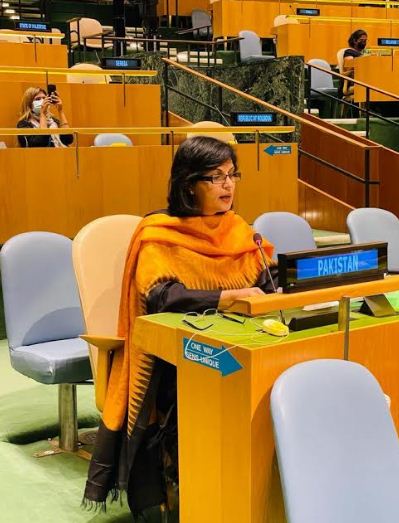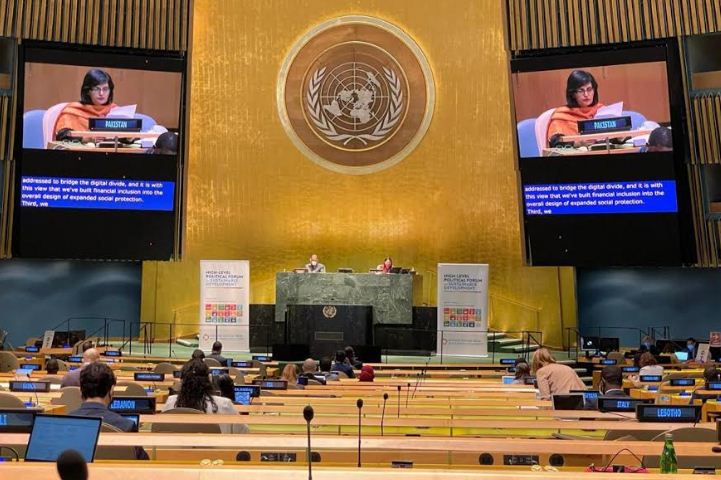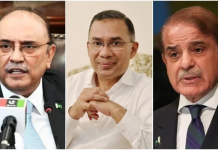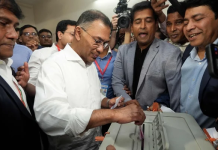DNA
NEW YORK, JUL 7: Sania Nishtar was invited to speak at UN’s high-level Political Forum (HLPF) on Sustainable Development. The session on, “The SDGs in time of crises: A sustainable, inclusive and resilient recovery from COVID-19 as an opportunity to realise the SDGs” had a town hall format to accommodate many high-level speakers given the importance of topic and various dimensions that needed to be covered for a sustainable, inclusive and resilient recovery from COVID-19 pandemic. This session was convened by ECOSOC, under the Presidency of Pakistan. (Ambassador Munir Akram is the current president of ECOSOC)

Bringing Pakistan’s perspective to the table, Dr. Sania highlighted that the Pandemic has unearthed an opportunity to recast the role of the welfare state, which needs to be a major part of the re-commitment to agenda 2030.“In Pakistan, we believe the social protection of today is the human capital, the resilience, and the economic inclusion of tomorrow. Investing in social protection is both a response to current needs as well as preparedness for and insurance against future crises. We are humbled that through Pakistan’s social protection program, Ehsaas—led by our Prime Minister—strong acceleration towards this goal is underway” she said.
The session was moderated by Achim Steiner, Administrator of UNDP. The session brought together Liu Zhenmin, Under-Secretary-General of Economic and Social Affairs of the United Nations, UNDESA; Senator Dr. Sania Nishtar, Prime Minister of Pakistan’s Special Assistant on Social Protection and Poverty Alleviation; Lord Tariq Ahmad, Minister of State for the Commonwealth and United Nations, United Kingdom; Henrietta H. Fore, Executive Director UNICEF; Sigrid Kaag, Minister of Foreign Affairs of Netherlands; s. Marsha Caddle, Minister of Economic Affairs and Investment of Barbados; Rola Dashti, Executive Secretary of ESCWA; Ndagijimana Uzziel, Minister of Finance and Economic Planning, Rwanda; Isaac Alfie, Director of the Office of Planning and Budget of Uruguay; Sofía Sprechmann Sineiro, Secretary General of Care International; Dominic Waughray, Managing Director, Centre for Global Public Goods, Member of Managing Board, World Economic Forum; and Jomo Kwame Sundaram, Visiting Senior Fellow at Khazanah Research Institute, Visiting Fellow at the Initiative for Policy Dialogue, Columbia University.
Referring to Ehsaas Emergency Cash, she shared three lessons with the international audience. “First, our experience has taught us that data innovations, delivery systems, and a commitment to integrity, transparency, and accountability are crucial to address the long-standing fault lines, that have plagued public sector delivery. Today, Pakistan’s reform hinges on these attributes. Secondly, gaps in financial and digital literacy must be addressed to bridge the digital divide and it is with this in view that we have built financial inclusion into the overall design of expanded social protection” she said further adding “Third, we must protect human capital from negative coping strategies that are inevitable as a result of the pandemic—and in this regard, Pakistan is amongst the first few countries that acted concretely”.
Building on the report of the Secretary General on, “Progress towards the Sustainable Development Goals” and the relevant General Assembly and ECOSOC meetings related to COVID-19 pandemic, the session took stock of the SDGs’ overall progress taking into account the impact of the pandemic and the experiences and responses of countries at various development levels. The session focused on exchange of experiences on policies and integrated approaches that are being implemented to address the socio-economic impact of the pandemic, while ensuring that recovery from pandemic is sustainable and resilient, putting countries back on track to realize the 2030 Agenda for Sustainable Development.
The high-level political forum on sustainable development is the core United Nations platform for follow-up and review of the 2030 Agenda for Sustainable Development and its 17 Sustaina

















